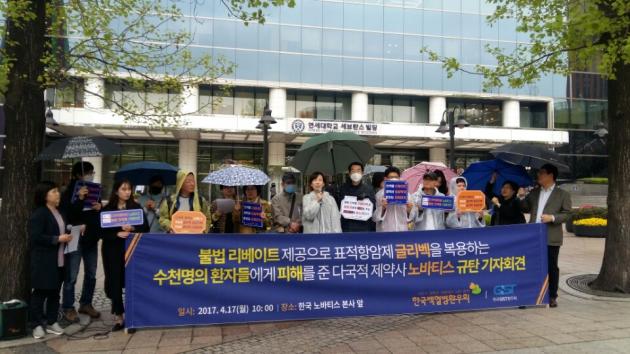Swiss company’s illegal rebates deprive leukemia drug of insurance benefits
Novartis Korea’s targeted anticancer treatment, Gleevec, is in danger of losing insurance benefits because of illegal rebates by its maker, Novartis Korea한국노바티스, forcing patients to denounce the Switzerland-headquartered company.
Two patient groups -- Korea Leukemia Patient Group한국백혈병환우회 and Gastrointestinal Stromal Tumor (GIST) Fellowship한국위장관기질종양환우회 held a protest rally in front of the Swiss pharmaceutical giant’s Korean offshoot in Seoul Monday to condemn the company’s wrongdoing and the government’s wrist-slapping.

The demonstrators said Novartis’ unethical behavior has cut off financially pinched patients’ access to Gleevec and endangered the lives, but the company has done little to ease their sufferings. If the government deprives Gleevec of its insurance benefits for long, the drug prices will sharply go up, leaving about 6,000 leukemia patients with little alternatives.
The Ministry of Health and Welfare is considering removing insurance coverage for the first-line treatment for chronic myelogenous leukemia (CLM), Gleevec. That comes as part of its “two-strike out” policy wherein a company’s medication is rendered uninsured if it is under the charge of offering rebates for the second time, making its prices rise, and sales fall, theoretically.
The ministry has taken off 41 Novartis drugs from the list of the national insurance coverage as punishment: for 23 products that have no alternatives, the ministry has slapped hefty fines instead of making them uncovered. It has delisted the other 18 drugs, Gleevec, which have substitutes from the covered medicines slapping small fines.
Gleevec, which turned the once fatal CML into a treatable disease, will become unaffordable for most if the punitive measure takes effect, and many must switch to generic drugs that some patients complain have painful side effects.
In principle, Gleevec is substitutable since its patent expired in 2013 and generics exist but leukemia patients, while citing efficacy-impairing side effects of the generics, are reluctant to switch to another drug for reasons related to the company’s wrongdoing, saying they are paying through the nose for the company’s actions.
“I suffered from indigestion, constant diarrhea, convulsions and muscle pain after I was forced to switch to a genetic,” one leukemia patient attested in the rain outside of Novartis Korea office. “I did not experience these symptoms when taking Gleevec, and I cannot believe that I have to suffer the consequences of Novartis’ illegal acts.”
Leukemia patients are also outraged over the “lack of respect for human life in punishing cancer patients for Novartis’ unethical actions, calling for the ministry to slap a heavier penalty on Novartis and to keep the drug insured.
“It makes no sense to tell patient’s to switch to another drug,” said Yang Hyun-jung, a member of GIST. “This is a cancer drug, not a cold medication. The ministry is irresponsible in punishing cancer patients instead of Novartis.”
The conflict between Novartis and patient groups traces back to Nov. 27, 2001, when patients filed a complaint against the Swiss pharmaceutical giant that demanded patients to pay high prices for Gleevec and even refused to supply the drug for a year and a half later.
Meanwhile, the ongoing bribery scandal will likely sharply erode in Novartis Korea’s sales and profits this year with 42 of its drugs facing delisting from insurance coverage, industry watchers said.
Novartis has reportedly given 2.5 billion won ($2.2 million) in kickbacks to doctors in exchange for prescribing its medication. The company also faced public scrutiny and fines for providing 7.2 billion won in rebates in 2011.
Under Korea’s two-strike out policy, Novartis must now face penalties in the form of having their drugs suspended and paying additional fines. If the rebate amount exceeds 100 million won, then the drugs in question will be permanently delisted from insurance coverage, a likely possibility that Novartis now face.
The Ministry of Health and Welfare has already suspended sales of Novartis’ DPP-4 inhibitor diabetes drug, Galvus, in March along with nine other products, while imposing a penalty of 200 million won on 33 items, including Gleevec, a treatment for leukemia.
Industry experts observed competing pharmaceutical companies with DPP-4 inhibitors are setting up sales strategies that anticipate the suspension or elimination of Novartis’ drugs from the market. Consumers are expected to turn to competing drugs that are insured for treatment, causing Novartis’ sales to drop sharply. Under the national insurance program, patients pay only 30 percent of total drug cost and, in the case of cancer drugs, 5 percent of medication costs.

